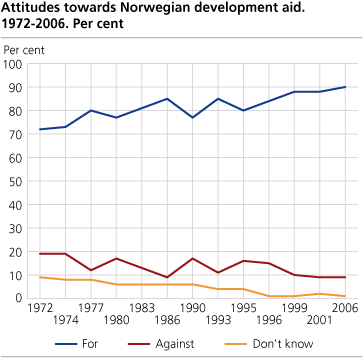Content
Published:
This is an archived release.
Strong support for development cooperation
Nine out of ten Norwegians are positive to the Norwegian cooperation with developing countries. This is the highest figure recorded by Statistics Norway since the poll started 35 years ago. Women are most positive to the results of Norwegian development cooperation.
A strong 90 per cent of the population in Norway are positive to Norway's development cooperation in Africa, Asia and Latin America. In 2001, this figure was 88 per cent. When the survey was first carried out in 1972, the figure was only 72 per cent. Norway is also involved in development cooperation with countries in Eastern Europe, former Soviet republics and Russia. The proportion of people who support development cooperation in these areas is slightly lower (81 per cent) than in Africa, Asia and Latin America.
One in three would like a smaller development budget
The development budget for 2006 was NOK 20 billion. 15 per cent of the population believe that this amount should be bigger, while almost half (47 per cent) believe that this is an appropriate amount. However, one in three (32 per cent) think that the budget should have been smaller and a very small group (2 per cent) believe that there should be no development budget whatsoever.
Three in four believe that Norwegian development cooperation makes a difference
A substantial 72 per cent believe that Norwegian development cooperation in general has good or very good results. Women and young people are most positive. 75 per cent of Norwegian women believe that development cooperation has had positive results, but this only applies to 69 per cent of men.
The population more or less agrees that Norad (the Norwegian Agency for Development Cooperation) manages the development funds effectively. 41 per cent agree to some extent or to a large extent. However, at least one in four (27 per cent) answered that they don't know. Most people agree to some extent that Norad ensures good quality in development cooperation, but a relatively large number say that they don't know. 44 per cent believe that Norad to some extent or to a large extent ensures good quality in development cooperation, while 28 per cent say that they don't know. There seems to be no widespread opinion that Norad is wasting development funds, as 43 per cent disagree to some extent or to a large extent that Norad is wasting money. Again, a substantial 28 per cent answer that they don't know.
Want to attach conditions to development cooperation
As many as 93 per cent of the population believe that certain conditions should be attached to development cooperation. This figure has been stable at a high level over the past ten years.
War and conflicts are seen as the main barrier for economic and social growth in developing countries. This has been the case each of the five times this question has been asked since 1993. In 2006, 80 per cent believed that war and conflicts in developing countries was a very important barrier for growth.
Few know who we help
When asked whether they know any of the countries Norway is involved in development cooperation with, seven out of ten say no. Those who say yes, list three countries on average. Four out of ten (39 per cent) are quite interested in news coverage on developing countries and development cooperation, while 8 per cent are very interested. These figures are more or less the same as in 1999.
Only 37 per cent of the population believe that the media present a true picture of the situation in developing countries. Compared with 2001, there have been no major changes in people's impression of the media's presentation of developing countries.
Find more figures
Find detailed figures for Attitudes towards and knowledge about Norwegian development aid,
Contact
-
Bengt Oscar Lagerstrøm
E-mail: bengt.oscar.lagerstrom@ssb.no
tel.: (+47) 92 26 67 81
-
Lise Snellingen Bye
E-mail: lise.snellingen.bye@ssb.no
tel.: (+47) 40 90 23 01

